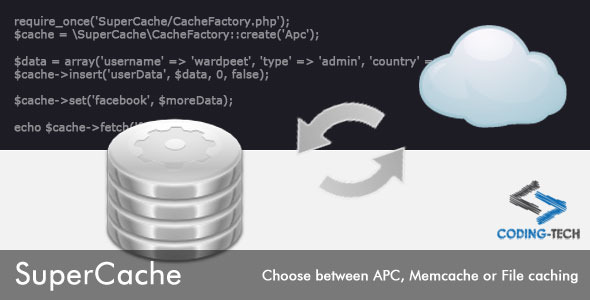SuperCache
- Last Update
- 16 August 2012
- Regular License
- $6
- Extended License
- $30
- Sales
- 13
Changelog
V 1 .0 Release version
V 1 .1
Splitted file cache in 2 seperate caching types. Session caching used a lot of resources. Fixed compression bug with memcache Update guestbook example (small update bug).
What is SuperCache SuperCache is an easy caching API for every project you might need. These classes reduces server load by using cache. There are three types of caching APC , Memcache and FILE /SESSION cache. APC and Memcache uses the PHP Modules so make sure you install them first before using it. File cache doesn’t need anything special.
Features
PHP 5 .3+: We used the latest php techniques including namespaces. OO written: We used OO techniques to make it easy adaptable and making it easy to add new caching methods. Compression support: GZIP compression on the data is possible.
Three Cache Types APC APC is a single server caching mechanism which allow you to cache data. APC also does opcode caching so your php doesn’t have to compile every time. (http://www.php.net/manual/en/book.apc.php)Memcache Memcache is a multi server caching mechanism which allow you to cache data. Memcache is a daemon that runs on your server which makes it possible to connect to it from everywhere you like. Also memcache is not bound to PHP . (http://www.php.net/manual/en/book.memcache.php)File File caching keeps the cache inside the session and rewrites it to the filesystem so we can pick it up again when a user reconnects to the website
How to use require_once("SuperCache/CacheFactory.php"); $cache = \SuperCache\CacheFactory::create("APC"); // use APC, Memcache, File (case-sensitive)
$cache->insert($key, $data, $lifetime, $compress); $cache->update($key, $data, $lifetime, $compress); $cache->set($key, $data, $lifetime, $compress); $cache->remove($key);
$cache->fetch($key); $cache->exists($key);
$cache->clearCache();
$cache = null;
$cache = \SuperCache\Cache::getInstance(); // return Apc cache or the one that was made with factory
